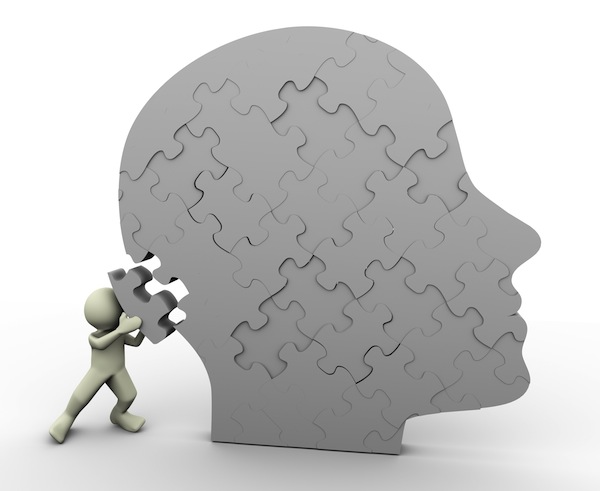
Think You’re in Control? You’re Not. How Mental Programs Are Running Your Life
This is the second article in a 3-part series about how our minds work. Click here for part one and click here for part three.
The first article in this series (“3 Parts of Your Mind That Affect Your Ability to Make Decisions“) explained the basic makeup of your mind, how your mind differs from your brain, and the complicated role your unconscious mind plays in making decisions. It gives a foundation that this article builds upon.
In my first business (a holistic health and wellness center), one of the main modalities I worked with was hypnotherapy. As opposed to hypnosis shows, where the goal is entertainment, hypnotherapy is concerned with changing entrenched patterns that are no longer serving the client. But let’s back up a step, shall we? To understand how to change these patterns, it’s useful to understand how they were created.
The human brain is a pattern detector. When the unconscious mind sorts the data it receives, it classifies it based on previous experience. When my baby hears a loud noise, he’s initially startled (or scared) and then looks for the cause. If he can identify that it was our dog barking, the next time he hears it, he looks to the dog first to see if she made the new sound. Sometimes it is her and his expectation is confirmed, but when the neighbor’s dog barks and our dog doesn’t appear to be making any noise, he’s a little more confused. Eventually, he will hear and see enough dogs barking to understand the sound (and its many variations) he’s hearing can be classified under the category of “dogs barking.”
Let’s take that example even further. Imagine the above pattern is what you experienced as a baby. If all of your experiences with dogs were positive, you might generally ignore the sound of dogs barking as benign background noise. If however, you were attacked by a dog at some point in your life, your unconscious mind would likely reclassify the sound of dogs barking as a warning of impending danger. If that was the case, the sound of a barking dog would stimulate your adrenals to start the fight, flight, or freeze response, possibly even before your conscious mind registered that was happening. That mental program would look something like this:
“If dog barks, then prepare to fight, run away, or freeze to protect myself from danger.”
You see, most mental programs are created out of a basic survival instinct, or from an intrinsic motivation to move either toward pleasure or away from pain. If you lived in a place where wild dog attacks were common, this program would be not only sensible, but incredibly useful. On the other hand, if you worked in a pet store where all the dogs were happy, loved, and friendly, this pattern would put your adrenal glands into overtime and cause unnecessary stress in your body and mind.
The mental programs we create as children are especially strong because they get repeatedly reinforced through the years.
Imagine you’re a young child learning math, and your teacher or parent (an authority figure) makes an offhand comment that you are slow at solving the problems. You might interpret this to mean “I’m not good at math.” Some time later, you get a few questions wrong on a quiz or homework assignment. This then validates your original assumption that you’re not good at math. As time goes by, every time someone says “math is hard,” or you think “I can’t do this,” your belief that you’re bad at math is reinforced. Even if you do well on a math assignment, by the time the pattern is established, any experience that opposes your initial belief is dismissed as an exception to the rule. This is important, so let me repeat it: if you receive data that contradicts an entrenched mental pattern, your subconscious will simply ignore it.
At this point, your mental pattern might be: “If presented with math, then give up.”
As you grow up, this pattern often gets reinforced without you noticing it, and if your emotions are involved, it is even harder to overcome. Imagine this belief that you’re bad at math makes you feel ashamed, stupid, or otherwise inadequate. Then you’ll need coping mechanisms to compensate for those unpleasant feelings. The program then might become, “If presented with math, then give up and make jokes about my terrible math skills” or “If presented with math, then give up and act like I don’t care.”
As a competent adult, you may be able to partially overcome your childhood programming. Maybe your first hire as a business owner is a bookkeeper, or you’ve found some way to power through your feeling of inadequacy. Most of the time, however, the programs we’re running are in the background of our awareness, so we don’t realize we need to address them. By the time you’re well-established in your business, if this pattern hasn’t been corrected, you might break out into a sweat every time you have to read or produce a financial report. Or, you might ignore the financial reports and hand the responsibility for them over to someone else entirely.
This is not to say that delegation is bad or you should be in control of every aspect of your business–quite the opposite. The difference lies in your motivation. If your decision is based in fear, feelings of inadequacy, or shame, that’s very different from a rational decision based on what’s best for your company.
Now that you understand how mental programs are created, the final article in this series (“5 Ways To Stop Your Mind From Sabotaging Your Hard Work“) will help you reprogram your mind and delete any bad programming that’s getting in your way. It gives you 5 simple strategies to stop sabotaging yourself and get real results.
This article was originally published on Inc.com in April 2016.

Author, activist, international speaker, multi-preneur, mentor, wife, and mom, Ariana Ayu is a Transformational Mystic and a Catalyst for Conscious Change.
She is the creator and lead educator for the CannyNurse™ Certificate Program, a 50-hour CEU program for nurses from LPNs through doctoral degrees, and the first comprehensive cannabis nurse training program designed for working nurses. An ordained priestess, holistic healer, and lifelong student of ancient/ modern wisdom, Ariana’s nursing background includes pediatrics, labor & delivery, nurse education, and Holistic Health/ Integrative Nurse Coaching.
She earned her MSc in Advancing Nursing Practice from the University of Edinburgh in Scotland (UK), and her Cannabis Nursing Certification from Pacific College of Health and Science.
She is passionate about racial justice, social equity, environmental preservation and conservation, and empowered health, wellness, and joy for all. Her practice is governed by the ethical principles of integrity, nonjudgment, empowerment, and respect for her clients’ autonomy.